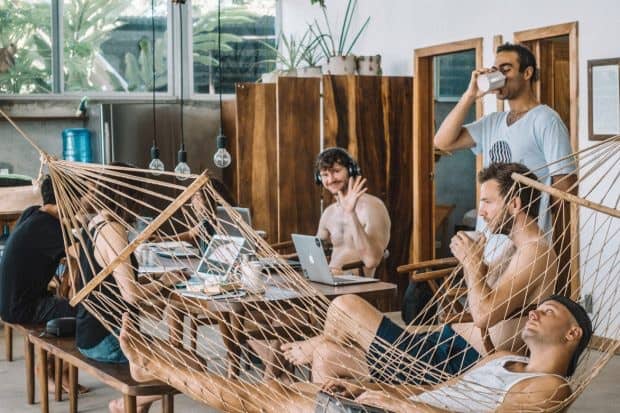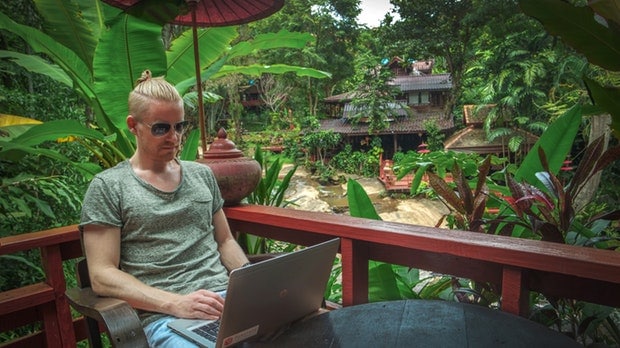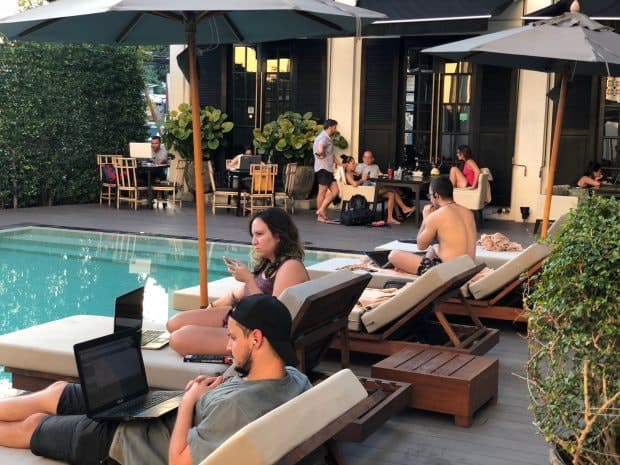
Digital nomads work in places where others spend their holidays. But how well does the balancing act between working and travelling in everyday life? A search for clues in Chiang Mai, the Thai mecca for web workers.

It is October; the thermometer shows a pleasant 27 degrees, it smells of coffee. In front of me, a monk in garish orange robes crosses the street and looks spellbound at his smartphone, I stand in front of the hotel and watch him. I feel a bit on vacation, although it’s a typical working day for me: I am waiting for a conversation partner who is delayed by a few minutes. Only I do not do that as usual in Hanover, but in Thai Chiang Mai, the mecca of digital nomads.
An hour’s flight from Bangkok, a whole city has become a biotope for freedom-loving digital workers: The fast Internet, low cost of living and the many cafes and coworking spaces attract a global community of entrepreneurs and the self-employed. From a distance, this sounds romantic, this new way of working under the palm trees. I want to see up close how everyday life looks like.
There is also a more significant question behind that, which concerns me. Maybe the life of digital workers in Chiang Mai is not only interesting for freelancers and travel crazy. Perhaps it also provides a blueprint for the business. Already, consultants are throwing words such as “New Work” and “location-independent work” around. Digitization enables such early utopian scenarios – because who sits in front of the notebook the whole day, theoretically, can do that not only in the office but everywhere. Automation is turning this vision of the future even further: Artificial intelligence is changing the term “work in general”, the question of the meaning of activity is increasingly being asked. In the ideal case, work should not only be financially rewarding, but it must also create the opportunity to realize oneself, everywhere, anytime. Digital nomadism can be described as a kind of precursor to this future.

A unique attraction for digital nomads lies in the combination of working on exotic places and travelling and discovering new places. Chiang Mai is ideal for short breaks as the city is surrounded by mountains and dense forests that house not only waterfalls and elephant reserves, but also potential jobs with internet access. Here, members of the wifi Tribe relax and work. (Photo: wifitribe)
Of course, digital nomadism and location-independent work are not synonyms. While a few German employers tentatively introduce the second working model, the first one depends on a high level of initiative, requires proper planning and involves some difficulties: How do I earn enough money? How do I organize the receipt of official documents without a fixed postal address? How do I open a bank account without a permanent residence and registration address? What about the work permit? I will hear about these worries in the coming days in Chiang Mai from almost every digital nomad I speak to.
New Work: Reality instead of talk
One of them is Sebastian Wolff. He picks me up in front of the hotel with his scooter. The 35-year-old has blond hair, short-cut on the sides, long on his head, wearing jeans and a T-shirt. He hands me a helmet, we get on the scooter and meander through the traffic of Chiang Mai, past cars, pedestrians and street vendors.
It’s 1 pm local time, and Sebastian just got up. The night before, he worked until four o’clock in the morning. Sebastian originally learned pharmacy; now, he works full-time in e-commerce. The digital nomad operates a total of three online shops for the US market and sells its products according to the dropshipping model: it only orders it from the manufacturer when a customer purchases it – so he does not need a warehouse. Also, he works as a business
It’s just before Christmas, and the drop shipper has a lot to do. Customers want to receive their gifts on time, the number of support cases is high, and customers expect feedback within business hours. It is essential to be more flexible in your working hours – the work is currently in progress when it is rooted in Thailand at night.
“I can do whatever I want, as I want, where I want and when I want.”
Before Sebastian’s scooter goes to lunch together – or in his day-to-day work: for breakfast – we stop briefly at a shed where he regularly delivers his dirty laundry. While he takes two full bags of mud from his scooter, he tells how he came to turn his back on Germany and his job. First and foremost, he was annoyed by long travel times to work, long working hours and high-stress levels. “Life in the hamster bike was just too much for me, and so I pulled the ripcord. My ideas for a happy life are just different. “
It’s easy to see exactly what these ideas are when you ask Sebastian what he values about life and work as a digital nomad. “Very short and apparent: freedom. I can do whatever I want, as I want, where I want and when I want. I’m my boss, do not have to file leave requests and work where others go on holiday, “he says.
That may sound tempting, but the 35-year-old assures that his focus is clearly on his business. He likes to work and not lie on the beach all the time, posting coconut photos – a dig on the growing numbers of digital nomads who deduce their raison d’être from Instagram and other networks. Accordingly, Sebastian does not refer to himself as a digital nomad but as a “slow nomad”. He spends most of his time working in front of his computer – but in different dream locations. He is not travelling all the time and does not have the urge to see 100 places a year. Instead, he spends several months at a time in one place. Currently, this is just Chiang Mai with him.
Sebastian, like many other nomads, appreciates the low cost of living in the Thai city of 130,000 inhabitants. This is a not to be underestimated factor because especially at the beginning of a career as a digital nomad or as a founder, it makes sense to stay where you can get the most with little money. Sebastian spends about 1,000 euros per month. This includes travel within Thailand, two massages a week, party nights and regular restaurant visits. But it is also much cheaper. Even with 500 euros a month, you do not live bad. For comparison: A Thai teacher earns around 400 euros a month with a weekly working time of 60 hours.
According to Sebastian, the city is also quiet compared to other Thai towns, the vast supply of coffee shops with excellent coffee, fast internet and sufficient outlets, the abundance of coworking spaces and the energy and the business mindset that emerges from the digital network Nomads from different countries results. “There are many other founders and startups here. That’s why trends not only get you started early, but they all sit in the same boat and help each other, “explains the drop shipper. Anyone who needs a digital service – be it a website, a logo or a content writer – will find it all at the next table in the café or one of the many local Facebook groups.
Structure in flexibility
Meanwhile, we arrived at one of the many makeshift food stalls that can be found on almost every street in Chiang Mai. We sit on the plastic chairs and Sebastian orders a few dishes in Thai. The digital nomad is one of the few exceptions that make an effort to learn Thai. For this, he regularly takes private language lessons. While we watch the two Thai women of advanced age, how they handle fresh ingredients, pots and pans, I want to know from Sebastian, what a typical working day for him looks like. The answer surprises me because the whole thing seems to be much more structured than I expected. Although the drop shipper does not lead a nine-to-five life, despite his freedom and flexibility in terms of time, he follows identifiable patterns.
He usually spends the morning with sports, language lessons, coconuts, iced coffee and fried rice for breakfast. Around noon, the working day begins. Mostly, the German meets with some other nomads to work in one of the many coworking spaces or cafes. For the first closing time, it goes to the typical dinner and then continues to work. In the case of Sebastian sometimes until late at night. This routine is interrupted time and again by gym visits, spontaneous trips to one of the many waterfalls abounding in the mountains around Chiang Mai, or attending one of the many meetups or talks.

Chiang Mai is so popular with digital nomads not only for its low cost of living, fast internet connection and good weather. The northern Thai city offers the right working atmosphere for every taste. If you like classic, you will find a desk in one of the many coworking spaces, such as Punspace.
For Julia Kallweit from startup wifi Tribe, the day usually starts much earlier. The 26-year-old founded a coworking and co-living service for digital nomads with her business partner Diego around two years ago. Julia also picks me up with her scooter. Without the vehicle on two wheels, nothing happens in Chiang Mai. On the way, she tells me about wifi Tribe. The company should enable location-independent working with like-minded people. Wifi Tribe organizes for participants not only accommodation, events and leisure facilities but also a large part of the precise necessities. Members pay between
$ 800 and $ 1,800 a month – depending on how long they want to travel and what kind of rooms they prefer.
The short scooter tour through the city takes us to a hotel – or the pool area of a hotel. Julia wants to show me how her group works recently. The hotel has also responded to the onslaught of digital nomads by offering daily or monthly passes to web workers – even those who do not live in hotels themselves. This includes not only the use of the pool but also access to fast wifi and a drink. After we got off the scooter, I look at a scene that sounds like the cliché of digital nomadism: Under palm trees are about 15 women and men between 20 and 50 years on sun loungers by the pool. Each of them has either a laptop or a tablet on his lap. In the shade, another group of five people sit at a table on which even an external monitor was built. The way in which digital nomads are working in the Thai city looks very different: While the one classic coworking spaces with desks, so instead need the office atmosphere, others prefer the leisure time and looking for cafes with a good Internet connection or loitering slightly around the pool.

The wifi Tribe is a kind of travel organizer for digital nomads. At the same time, different groups are travelling on different continents. The Asia Chapter has discovered working at the hotel pool.
For Julia, Chiang Mai is just a stopover. She will be in Thailand until May, then move on. She has a clear checklist for good nomad locations: Medellin, Bali and Cape Town. All places Julia calls “Level One Nomad Destinations”. “They are super accessible, easy in everyday life, provide a quick familiarization period, a huge community, and there is almost everywhere fast and reliable Internet available”, explains the German. “Places like Bali or Lisbon also score points with the beach location.” This is one of the few advantages that Chiang Mai can not score with. Maybe the hotel pool is so popular with some nomads.
Working in the grey area
If you want to work in Chiang Mai, you must first familiarize yourself with the conditions of residence. As a German, you get a so-called “visa on arrival”, which is valid for one month. If you want to stay longer, for example, you can apply for a tourist visa, which is valid for 90 days. This is still not a work permit, so many digital nomads in Thailand are in a grey area. The authorities also know that.
For example, a nomad told me about a raid by the Punspace Immigration Department – one of the largest and first coworking spaces in Chiang Mai. The immigration officer took all foreigners in the attack because it assumed that the nomads work not in, but for the coworking area. That would be forbidden in Thailand in any case. Occasionally the authorities seem to lack the understanding of what a coworking space is. The digital nomads then told the authorities, without exception, that they were on vacation and had only checked their mails. It was easier than explaining precisely what a coworking space is. They were then allowed to go again.
But digital nomads do not just have to think about where to pitch their laptops. Just like Julia and Sebastian, you have to think about how they make money. The same rules apply as for founders or self-employed in the home country: Anyone who comes from an employment relationship must first change. “The first year was tough and marked by challenges, sleepless nights and sometimes up to 100 hours per week,” says Sebastian Wolff. In the first twelve months, he earned little money, only then it went uphill.
What made it easier for him as a digital nomad compared to the normal self-employed, but he had chosen a country with low cost of living, the money lasted longer. His advice to those who have embraced this lifestyle is to stay flexible, be aware of their strengths and weaknesses, save money for the first six months and then network in a cheap country like Thailand, gather ideas and get started.
The fact that Sebastian stuck to his idea of free work, despite the initial difficulties, is also related to the situation in Germany. “I wonder how long it will take for employers in Germany to finally offer their employees more flexible working models and to recognize the advantages of home office work and remote working,” he says. “Flexibility is more valuable to many today than a salary increase. I think I’m not alone with this attitude. “
After my talks with digital nomads in Chiang Mai, I can confirm that. I encountered very different working models during my stay in Chiang Mai. People who work in the coworking space, people who prefer cafes and people who work with their laptop by the hotel pool. I have met digital nomads who are programming, translating, designing, or selling online products, even ones that make a living
Deserve to explain to others how best to become a digital nomad yourself. I’ve talked to people who work well over 40 hours a week, looking for the perfect balance between work and play, who do not know precisely how to make money online, and finally, those who travelling and having fun and wanting to finance it with the least possible effort. They all have in common that they want to break out of traditional working models – just like Sebastian.
For many people I met in Chiang Mai, digital nomadism is a lifestyle. They travel the world and work in exotic locations because of this way of living and working releases creative energy from them. Maybe this is why digital nomadism often means freelance work. That they do not work for companies, is probably also because at least German employers, especially with the combination of travel and work difficult – even if they are not reserved working and home office days are averse.
In doing so, wifi Tribe shows that you do not have to go through the whole thing the same way and that you can claim the benefits of this working model for a limited time. At the startup, not only people are now customers who are looking for startup support as a digital nomad. Employees or companies are also increasingly booking selected coworkingcoworking jobs for several months and travelling with wifi Tribe. Why do not more companies realize that it can be worthwhile sending employees to the other end of the world for a few weeks to work there, and organizing such temporary and inspiring wallpapers themselves?
When I sit back in the plane and leave Chiang Mai, this idea lingers on for a long time. Having set myself up in coworkingcoworking spaces in the city, I can affirm that it’s inspiring to do my job in a completely new and exotic environment. However, it does not always have to be the big full world. In Hannover, I regularly work for a day in a coworking space and not in the rooms of the t3n editorial office. This also has a very positive effect on my productivity, although there is a lack of pool, good weather guarantee and the exotic trappings and I do not work freelance.
So maybe it’s not so much the country that makes the difference, but the flexibility to work where you want. This goes hand in hand with what many nomads have told me: that they hope that a change in thinking will take place in companies and companies in Germany and other home countries and that old models will be broken up. Some of them would even come back home.
